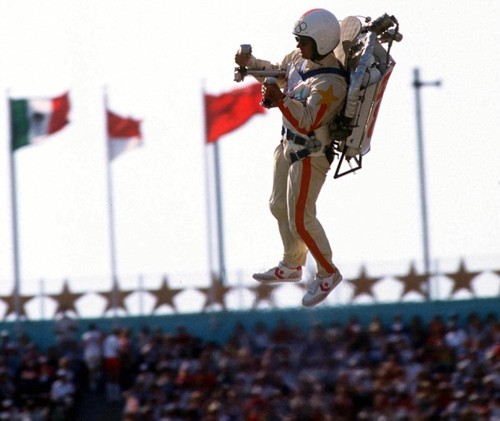The Olympics weren’t always a corporate event treated like a telenovela on TV–that began in 1984. Los Angeles Mayor Tom Bradley and IOC organizer Peter Ueberroth took a Games no one wanted and put it in the black by drowning it in corporate green. It was a financial success, though it changed the event for good. Ueberroth’s Olympic glory led him to be named Time’s “Man of the Year” and become MLB Commissioner, his five-year run marred by the collusion scandal, which not only broke the rules but was also a colossal misunderstanding of baseball economics. The opening of “The Branding of the Olympics,” Hua Hsu’s Grantland article about 1984’s changing of the guard:
“Tom Bradley liked to tell the story of how he watched the 1932 Olympics through the fence of Los Angeles’s Memorial Coliseum. He was 14 at the time, and the pageantry and spectacle of it all offered a welcome reprieve from the uncertain world around him. There was no Great Depression, no future, no worries — just these races he could still recall in startling detail nearly 50 years later. He could never have imagined that an African American might one day be mayor of this growing city and that it would be him. It could never have occurred to him that this moment of pure astonishment would become part of a story he would tell over and over — a story that would change the Games forever.
Nobody wanted the 1984 Summer Olympics.1 But the success of those Games revitalized the possibilities of such global spectacles. We take it for granted nowadays that hosting big, expensive, and complicated events like the Olympics or World Cup is a desirable thing for cities and nations. They have become ways of announcing a regime’s makeover or burnishing a national brand; at the very least, politicians and developers invoke hosting duties as an official mandate to raze like hell. In the late 1970s, though, the Olympics weren’t seen as profitable or peaceful. Violence had marred the 1968 and 1972 Summer Olympics. The 1976 Montreal Games overran their budget so drastically that the debts weren’t paid off until 2006. When it came time in 1978 to find a host for the 1984 Games, the only cities that expressed interest were Tehran — which withdrew before making a formal bid — and Los Angeles.
Taxpayers and city officials balked at Bradley’s proposal to bring the Games to L.A., especially as tales of Montreal’s financial woes began to circulate. But Bradley used that unwillingness to his advantage, agreeing that taxpayers should not have to bear the burden of the Games and floating the possibility instead that they be staged without any direct public funding. The city’s existing facilities were sufficient, and corporate sponsors could pay for whatever else needed to be built. The rest of the operating budget would come from ticket sales, television, merchandising, and licensing.
Besides the initial Games in 1896, no Olympics had been underwritten entirely by private money. And other than the 1932 Games in Los Angeles and 1948 Games in London, no Olympics had ever reported a profit.2 In 1980, Peter Ueberroth, who had been appointed to head the L.A. Olympic committee, explained to the New York Times that these Games would be the first ‘free-enterprise, private-sector Olympics, with no taxpayer money.'”
______________________________________
The 1932 L.A. Games that Bradley watched as a child:
The 1984 Games, featuring a UFO:

